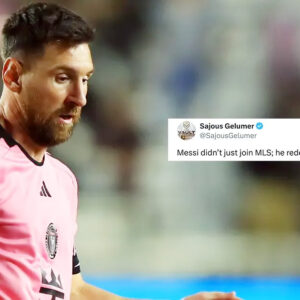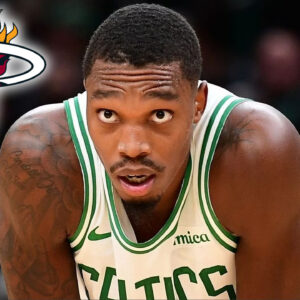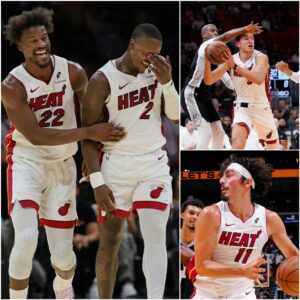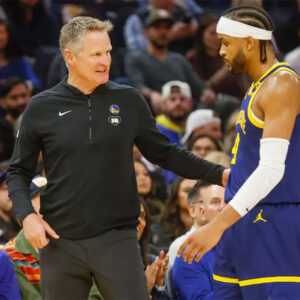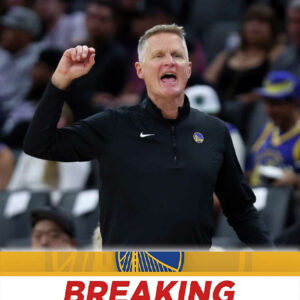“LeBron is the best we’ve ever seen… talent wise, just straight off the rip he’s the best player”
– KAT on the GOAT “debate” 🍿🫨
🎥 – @ClubShayShay pic.twitter.com/Jl7ls6q8I3
— ²³ (@SpeakContext) October 2, 2024
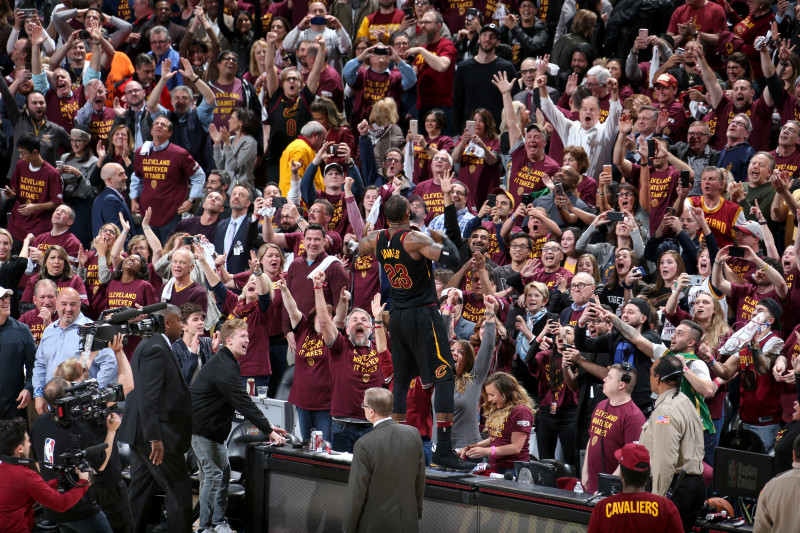
Nathaniel S. Butler/Getty Images
Just after his rejection of a driving Victor Oladipo kept the game tied for the final possession (it wasn’t called, but the league has retroactively admitted it was goaltending), LeBron James did away with any controversy. Even if his opponent’s layup had counted as two points, the ensuing pull-up triple from the top of the key would still have allowed the Cleveland Cavaliers to emerge from Wednesday’s Game 5 with a 3-2 advantage in this competitive first-round series:
That bucket was the feather in James’ cap during a night that saw him record 44 points, 10 rebounds, eight assists, one steal and one block* on a 14-of-24 shooting display also featuring a 15-of-15 performance at the charity stripe. It was the latest exclamation point from a series filled with individual heroics as the future Hall of Famer has willed his lackluster running mates into the lead. It was a shot we’ll see replayed time and time again.
But it’s not going to push James past the ghost he’s been chasing in the GOAT race.
Michael Jordan remains the only enduring test of James’ greatness, and catching him is an unachievable, Sisyphean task in the minds of myriad basketball fans. The Cleveland Cavaliers superstar can never erase his Finals losses. He probably won’t catch Jordan’s collection of rings. He doesn’t inspire that same level of fear on the biggest stage—perhaps a testament to the quality of the opponents he’s been forced into facing the last few years—even as he carries with him his own air of inevitability.
One clutch jumper against an Indiana Pacers outfit led by a struggling Victor Oladipo isn’t going to change that. That legacy-boosting bucket may have served as a quality simulacrum of “The Shot” Jordan once drained in the first round against, ironically enough, the Cavaliers. But it’s only three points. It didn’t even win a series, much less a title.
And that’s fine.
James doesn’t have to be the greatest performer in basketball history for his career to be a success. After all, he’s already the best player we’ve ever witnessed. And over the last decade-and-a-half, we’ve all been witnesses.
‘Greatest’ vs. ‘Best’
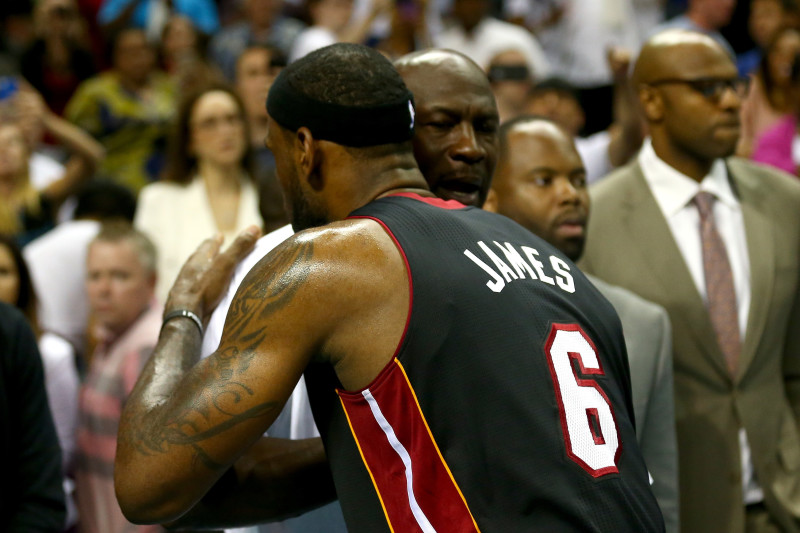
Streeter Lecka/Getty Images
These two concepts are not one and the same. Nor are they mutually exclusive. Depending on the sport, the same player can occupy both roles, or you could have two entirely different people staking their claims, as is the case for the NBA conversation.
In tennis, Roger Federer and Serena Williams take both honors among men and women, respectively. Tiger Woods is the best golfer we’ve ever seen, but he’s not a runaway favorite for the title of greatest when compared to Jack Nicklaus, Bobby Jones and other earlier legends of the sport.
And since any conversation centered around James and Jordan is inherently divisive, let’s go ahead and double down: While Barry Bonds is the best hitter in baseball history from a statistical standpoint, the steroid allegations put a serious damper on his ability to also serve as the sport’s greatest figure.
“Best” revolves around sheer capacity for playing the sport. Jumping back to basketball, we’re looking at the innate ability to dominate a game in a number of different areas, thriving on both ends of the floor and producing unprecedented feats with the orange sphere.
Wilt Chamberlain is more “best” than “greatest,” and he may well be one of James’ closest competitors in this category because of his overwhelming ability against other legends populating his era. Bill Russell is the opposite. You can engage in any number of granular debates on this topic, ranging from Chris Paul and Magic Johnson at point guard to Tim Duncan and Kevin Garnett at power forward.
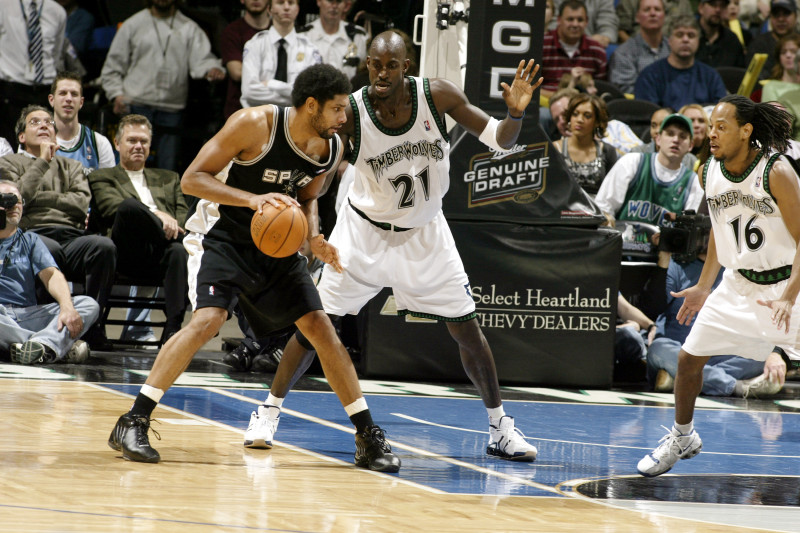
David Sherman/Getty Images
The best player is the one you want running the show while you’re trying to win a single contest—not necessarily a championship, but a single game against an unnamed opponent. He’s the ultimate basketball player. In the simplest possible terms, he’s the best at his job.
“Greatest” is only slightly different, but the term ushers in legacy components that are—at least partially—beyond a player’s control. This is the category bolstered by the RINGZZZ argument. It’s where we give Jordan so much credit for his perfection on the sport’s greatest stage, which allowed him to become the preeminent modern-era champion and the measuring stick for any new-age studs.
Would Jordan have enjoyed the greatest career in NBA history if he weren’t permitted to play alongside Scottie Pippen, Toni Kukoc and a host of other premier talents? We’ll never know. But he did enjoy a stellar supporting cast—objectively a far stronger one than James has seen—and no one can take that away from him.
On the flip side, might James have accumulated a more sterling record in the NBA Finals if he hadn’t been tasked with toppling historically excellent squads such as the dynastic Golden State Warriors and the 2007 San Antonio Spurs, who were so vastly superior to his dragged-to-the-end Cavs? We’ll never know. But he did face tough opponents—objectively a far deadlier collection of foes than Jordan battled—and no one can change that.
These are legacy-driving cases that help us evaluate who the greatest athlete might be, but they’re largely beyond a player’s control. James admittedly tried to change the strength of his supporting cast by serving as a de facto general manager and sparking the creation of a Big Three with the Miami Heat. But can we be certain Jordan would’ve remained in the Windy City if he’d not been granted the luxury of enjoying a contemporaneous career with Pippen?
Unless you have the ability to hop between multiverses, you can’t guarantee anything.
Ultimately, those subjective discussions are irrelevant when trying to figure out who’s really the best at playing basketball. That’s a simpler conversation, and it’s one that favors the do-everything James.

